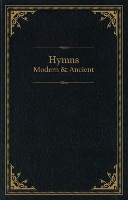What, in your opinion, is the proper relationship between video clips & sermons (assuming well done)? Avoid other if possible
Poll Results
What, in your opinion, is the proper relationship between video clips & sermons (assuming well done)? Avoid other if possible
Discussion
Hymnal Review - Hymns Modern & Ancient
 Conservative, Traditional… and New!
Conservative, Traditional… and New!
Hymns Modern & Ancient is a short collection of hymns and songs (133 in all) in a volume intended to supplement, not replace, more comprehensive hymnals already on the market. The collection is compiled by Fred R. Coleman and includes several of his hymns. Ruth Coleman, his wife, provided most of the arrangements.
Quality over quantity
I’m reviewing this collection as a non-professional musician. Though I play the piano a little, lead singing often and have sung in choirs most my life, my musical sight-reading skills are not sufficient to sit down an play hymns and songs I don’t already know—at least, not in any reasonable length of time. As a result, the large number of unfamiliar songs in HMA are difficult to evaluate musically. If the half dozen or so I’m familiar with are a good indication of the quality of the rest, the music throughout is fresh but—relative to where we are in musical history—conservative.
The collection consists mostly of work from the last few decades, with a smattering of undeservingly-neglected work in the more “ancient” category. The collection manages to avoid the chorus genre almost entirely (“I Worship You, Almighty God” may be the only song in the chorus category). I’m encouraged that it’s even possible to gather more than a hundred conservative, traditional and new hymns and hymn-like songs of good quality. The existence of this collection suggests that something like a revival of serious hymn singing may be in progress.
Discussion
"As schools continue to cut programs and eliminate positions, your church faces an incredible opportunity for service"
Body
Discussion
Pat Robertson: Earthquake may be a divine sign
Body
Discussion
D. A. Carson on Generational Conflict in Ministry
Body
Discussion
Web Site Gospel Presentation
Discussion
Does your church have an inter-generational Sunday School Class?
Poll Results
Does your church have an inter-generational Sunday School Class?
Discussion